A lock-down activity
I am sure I am not the only coach who misses the routine of planning and delivering training sessions. I also missed the interaction with the players and other coaches. I like talking to the players and coaches to get to know them personally but also to know what they like from training sessions.
To combat this, I recently decided to send out a brief questionnaire to a under 12s group of players I have being helping. When designing this questionnaire, I had to make sure I used words that they would understand, the last thing I wanted was to make them feel inadequate or not want to complete the questionnaire. The questionnaire had two sections and I will talk about these further below. I made sure the players and the parents know that the answers provided will be kept private and only viewed by myself. By doing this I am hoping that the players will give honest answers, which will help me planning future sessions to match the players wants and needs. Unfortunately, not all players responded to the questionnaire but that was to be expected and no one was pressured in to answering questions.
The aim of the first section was to garner their opinions on training sessions as a whole and was split into four basic questions:
1: What do you like about training?
2: What would you like us to do to make training better?
3: What activities have you liked in training? Describe these activities
4: What activities would you like to see less of in training? Describe these activities
In this section all players that responded that they liked the matches at the end of training. In these matches it wasn’t just a case of letting the players play, if we saw something that the players, either individually; in units; or as a collective we would stop the game or call the player over to talk to them. This was also the case if we saw something we thought that they had done well so they knew that they would receive praise when and where it was due.
Another popular response was that they liked one certain activity that we do called the numbers game
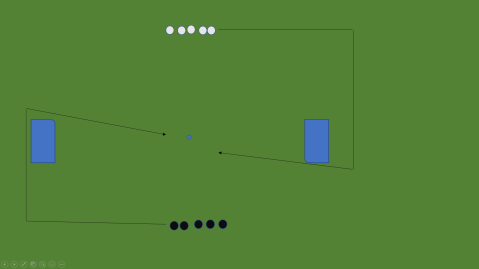
In this activity, the players are split into two groups, each one of those groups is then told to give each player a number. A football will be then placed in the middle of the pitch and the coach will shout out one number, once the number is shouted then the player from each group whose number has been shouted has to run as shown on the picture above and the aim is to score a goal. To progress this, you can shout two/three/four/five numbers to give the players a different challenge.
One player replied that they would like less shouting at training. No other player responded with this, but this doesn’t mean that the one player is wrong, and we should ignore the response. This is the players personal preference and we should be able to tailor our coaching style to accommodate all players.
The next section of questions were aimed towards the players individual development. I have seen a lot of these types of questions where the players were asked to rate themselves between 1-10 etc for certain aspects. I avoided this for two reasons. Firstly, how does a player determine what a 1 represents and what a 10 represents. How do they know if they are comparing themselves to a member of the team or to the best players in the world. Secondly, players might not want to place themselves at the lower or higher end of the scale and therefore more likely to gravitate towards a five. I therefore simply listed numerous areas.
In the next section please place a cross next to all the areas you would like to improve in. If you are happy with that part of your game, then leave these blank.
TECHNICAL/TACTICAL
Passing
Ball control
Heading
Positioning
1v1 defending
Running with the ball
Dribbling
Crossing
Finishing
Off the ball movement to create space
Tackling
PHYSICAL
Speed
Strength
Coordination
Stamina
Balance
PSYCHOLOGICAL
Concentration
Communication
Confidence
Decision making
Game understanding
SOCIAL
Leadership
Work ethic
Enthusiasm
Teamwork
Working as part of a unit (defence, midfield, or forwards)
If you play in goal, please also fill out this section:
TECHNICAL/TACTICAL
Handling
Positioning
Claiming crosses
Shot stopping
Goal kicks
Now some players placed a cross next to an area that I agreed with and some placed a cross next to areas that I was shocked with. One player who was always giving advice at training and directing his teammates stated that they struggled with confidence, now this was not something that I had noticed, and it shocked me. If a player has placed a cross next to an area I do not agree with, it doesn’t necessarily mean that I am right, and the player is wrong. It means that we have differing opinions. By having a personal chat with the player at a later date, we can discuss this, and it might be something as simple as the player needed praise in that area. It could be something that I need to change myself but without asking those questions how am I to know? When I next deliver a session with this group of players, I can make sure my session meets their needs and wants. I can also set individual challenges to each player that will benefit their development. Why not send something similar to this to your players, the responses you receive might surprise you. But it will also help you improve your sessions and help develop your players.
Culture and Performance vs Trust
I have recently been watching a lot of videos and listening to podcasts by Gary Vaynerchuk and Simon Sinek. Whilst these videos are nothing to do with coaching per se, they did get me thinking about how their messages and thoughts can be transferred to coaching and management in sport.
The video I want to talk about is The Biggest Misconception That Bosses Have About Employees by Gary Vaynerchuk. In this video Gary is asked for his advice on building a great culture in a company. He splits this down into three short but concise points. I will now list these points and how I relate these to my own culture I aspire to have.
His first bit of advice is that as a boss you have to realise that you work for them and if you do not do that then you’ve lost. He also states that you will never ever build a good culture in your company. I have already referred to this previously, but I will reiterate it again. When I start with a new group of players, I will always get them together before the first training session and say, “my role as your coach is to improve you as individuals and as a team, I’m not here to massage my own ego”. I also explain that I will plan and deliver sessions from what I have observed from previous games. I, however, say to the players that if there are things that they feel they need to work on then I want to know, and I will plan and deliver a session for them. I also say to the players that if there is a something, I have done in that session that they enjoy then to tell me and if there’s something they didn’t enjoy then I want to know. I don’t just want the players to say they didn’t enjoy something; I want to know the reasons why. I feel that as a coach I need to be approachable, I need to have a relationship with my players that allows for a two-way conversation and I need to allow the players to trust me.
Gary’s second point is that you have to micromanage all your staff members wants, ambitions and needs on a daily basis predicated on what else is going on in their lives day after day, month after month and year after year. He follows this up by saying you have to figure out what drives them, is it money? Is it work-life balance? Or is it you buying them tickets to watch their favourite team and then they realise that you listen to them and you know something about them. He also says that by talking to staff you can realise that what motivates them can change due to their personal life, so an employee who is young and is motivated by money might be motivated by work-life balance once they get married and have children. Or even an employee who has a personal tragedy and they have to leave for 9 months or so. This point relates to the previous point, if you as a coach or manager are not approachable then you won’t get good information from these one to one chats. A player might be having personal problems, and this might affect their performances, or they might even leave the team all together. If the player feels they can talk to you then you could offer help and advice. If the player tells you they need time away from the game and team then you should allow them this time, and hopefully they will respect your help and come back to the team once they feel prepared to. If you pressure them into carrying on or coming back before they are ready, then you might lose them forever. Also, if this player tells his team-mates how understanding you have been this will increase the confidence of all your players, and they are more likely to approach if they are having any issues.
Gary’s final point is that the only way to build a great culture is not only through words written on the wall, but in your actions you have to make everyone of those people understand that you care more about them than you want them to care about you. He says that it is tough, but if you do it, you will build a great culture. And if you don’t, every step of the way that you do less of it, you will have less of that culture. He ends his speech by saying that one of the best things that he does is that most talented people in my company, if they are not bought in to being the bigger woman or man in every situation, I don’t care if they are the number one sales person, the best creative director they are fired. And the second you let someone get away with something you will lose.
This final point is also talked about by Simon Sinek in his video Performance Vs Trust. In this video he draws a graph as shown below. On one side is the word performance and the other side is the word trust. The navy seals define the terms is performance is their ability on the battlefield and trust is their performance off the battlefield. So, performance is their skills and trust is how are you off the battlefield, what are you like are as person. Or more simply I may trust you with my life but would I trust you with my money or my wife.
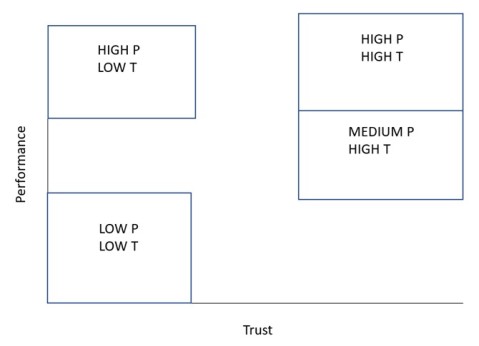
So, in an organisation nobody wants someone who is low performance and low trust obviously and everybody wants someone who is high performance and high trust. What the navy seals learned is that a person who is a high performer and low in trust is a toxic leader and toxic team-member. They would rather have a medium performer of high trust than a person who is high performer and low trust. Simon then goes on to say that the problem is that we have a million and one metrics to measure someone’s performance, and negligible to no metrics to measure someone’s trustworthiness. So, in business they end up promoting or bonusing toxicity which is bad for the end game because it eventually destroys the whole organization. The irony is that is easy to find the high performer and low trust, go to any team and say, “who’s the asshole?” they will all point to the same person. Equally if you go the same team and say “who do trust more than anyone else? Who’s always got your back and when the chips are down they’ll be there with you?” they will all point to the same person, it’s the best naturally gifted leader who’s creating an environment for everybody.
Relating both these points back to coaching, sport and culture. If your star striker for example is scoring lots of goals in a game then rightly they deserve praise, but if they are not buying into the culture you are trying to instil in your team then in the long run it will have a negative effect on your team. If the strikers team-mates see the star striker, missing training or turning up late to games which is against your culture and they are getting praised, then the team-mates might start acting the same way. Once standards start to slip then results will nearly always follow. Therefore, despite the performances on the pitch it might be best to get rid of the player if they are not acting how you want them to off the field.
This is something you should consider when naming your captain, if you can find a player that is high performing and high trust, then firstly you are a very lucky manager and secondly you make them your captain. If your captain is a high performer but low trust then they will not inspire their team-mates at all. However, if they are a medium performer but high trust then they will be a better choice as captain than the high performer and low trust.
As coach or manager, you also aspire to be someone who is a high performer and high trust. As someone once said “I couldn’t even think what good leadership looks like, but I can tell you what bad leadership feels like”.
You can view both videos mentioned on the links below:
Gary Vaynerchuk The Biggest Misconception That Bosses Have About Employees
https://www.youtube.com/watch?v=Qp0AP44-kos
Simon Sinek Performance vs. Trust
https://www.youtube.com/watch?v=Y4dyADuYfbg
Targets and self-improvement
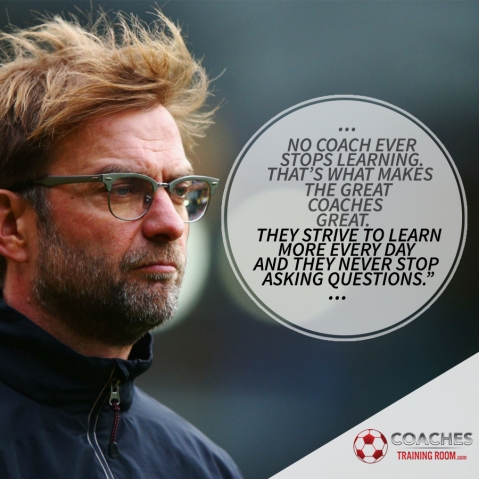
As coaches we regularly talk about setting targets for our players and teams. For individuals such as strikers in football we might set goal targets, or we might set a player a target such as learning a new skill or technique or a new position. For teams we might set a points target, learning a new formation or achieving promotion. In team sports setting an individual target could help the team achieve their targets. Goals give individual players and sports teams targets and numbers to strive for, and they can also be used as a measuring stick to monitor progress. Goals should be agreed upon between a coach and player and revisited as the competitive season progresses. All targets set need to be achievable or not too easy, if the team or individual feel the target is not achievable or too easy then they might not be motivated to achieve that target.
However, how often as coaches do we set ourselves targets or look to improve ourselves. This is something I have become more aware in recent years. Before I could look at self-improvement I needed to do some self-reflection, I needed to decide what were the priority areas for myself to improve. This doesn’t mean I will rule out improving in other areas. The main area I need to improve on and one that I always gets joked about from other coaches that know me, is the planning and reviewing of sessions. Whilst I am ok at planning the session I am not always the best as reviewing the session and getting feedback from other coaches and the participants, especially with a new group of players. I feel I have improved on this, but I still have some way to go before I am happy with my progression. Another area of progression is stepping in and giving feedback to players, again this has improved as I get to know the players.
I have set myself a target of 3 hours of self improvement per day, this is not just coaching related but could also be improving my physical and mental wellbeing as well. The reason for picking this time frame came about after I got a notification on my phone as to how much I was using it per week, it said my usage was 8 hours a day, I then realised that the majority of this time was just browsing social media rather than doing anything productive. I have recently applied to study my UEFA B coaching course, I feel this course will help me improve in the areas I have previously mentioned.
To help improve in other areas of coaching I have started using the plethora of data available with the increase of social media. On Facebook I am a member of the grassroots coaching and coach2share pages, whilst on twitter I follow the coaches voice, plan it coach and the coaching family, I also use YouTube to watch sessions to gather ideas about sessions. Recently I have started listening to podcasts, these aren’t necessarily coaching based but could be about leadership or dealing with different types of players and people.
So, whilst you are thinking of targets for your player and teams, why not allow some time for self-reflection and give yourself some targets to achieve over the course of the season? I am aware that a lot of people might not be able to commit to 3 hours per day but any amount of time no matter how small will benefit you and those that you are coaching.
The Two-Way process with younger players
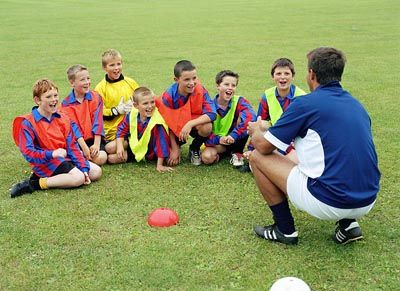
Following on from my last blog post I was asked if I would use this process with a younger age group. This was a blog I was always going to do but this request has made me do it earlier than anticipated.
When coaching younger children, we are always told sessions should be fun, but who decides what is fun for your players? Is it you the coach or is it the players themselves?
I have coached children from the age of 3 to the age of 18, and one thing I have always been mindful of is are the players enjoying the session. To make it enjoyable I firmly believe that you have to know your players. Now with the younger age groups of 3-11 this can be more challenging than with the older age groups 12-18. The older age groups you can start to implement the two-way process that I talked about in the previous blog post.
I will use the example of a team I coached whilst at University for the younger age group. I started coaching this group in an indoor church hall when they were just 4 and 5 years old. It was my first time coaching this age group and took me out of my comfort zone. The first thing I noticed was the smile of the child’s faces when they scored a goal. At this age group I found that some children are a lot more vocal than others, when I asked them questions at the end of the session about what we had worked on I found that it was the same children putting their hands up each time. Now I could presume that the children who did not answer were not interested in football or I could seek to determine why they were not answering. It became aware that each child is different, some children were happy answering in a group, others were more comfortable answering in a one-to-one situation. It wasn’t that they lacked interest it was more to do with them being shy. If I didn’t have those one-to-one interactions with these children, then I am only catering my sessions to a certain part of the group. I then followed these conversations by asking the players what they enjoyed in the session, every single one of them answered that they liked scoring a goal. This helped me in planning my sessions. I found that if I tried to get them to work on certain areas of their game such as tackling or passing, they were less receptive than other areas of their game. However, if I planned the session so that it always included the chance to score a goal their motivation and enjoyment increased massively.
Once the children started to get older (6 and 7 years old) and their knowledge increased, I started giving them a bit more ownership of the session. If a player asked if they could do a certain drill this week, then I would always say yes. This didn’t happen very often, but I was not going to deny them some ownership and enjoyment, it was only a 10-minute drill out of the 90 mins I had with them. If I knew that it was the players birthday on the day of the session, I would allow them to pick any drill we had done previously. Both of these helped me understand the players and also determine what the players liked from the sessions. Perhaps more importantly though, it made sure the children felt involved in their progression and development.
In this group there was one player who was his own harshest critic, I know this from talking to his dad and the child himself. Some people would say he had an attitude problem, but I felt that by not determining the reason for the outburst he had, I was doing him, myself and the rest of the group a disservice. If I tried talking to him when others were around, he would either storm off or refuse to talk to me. I have a great relationship with this child’s father and asked if he minded if I talked to the child one-to-one after the session and he agreed. I didn’t want this to feel like an interrogation to the child, so I made sure I had a football with us and chatted to him whilst we passed a football back and forth. I found that he sometimes found the sessions weren’t challenging him in the way he wanted. By having this chat, it allowed me to set him personal challenges. Now this never got rid of his competitiveness and his outbursts, but it did reduce them massively. I would never want his competitiveness to be reduced, just channelled in the correct way.
Another way of getting to know the children is to talk to the parents, you as a coach only see the children for a couple of hours per work if you are lucky, the parents however will see their child a lot more, this is something that can be achieved in numerous ways. Firstly, by getting to know the parents. I was lucky that I had another coach with me so if he was doing part of the session, I would have a chat with a parent. I would ask them how they were and what they had been up to. The conversation would then turn to their child and how they had been at school etc. Another way of talking to the parents is by a simple message. If a child has done well in training or a match, I will message the parent and let them know. It is vital that we give praise to children when we feel it is required. The child is then getting praise from you the coach but also from their parent.
As a coach we need to know the players we are dealing with and how to help them realise their potential. This process needs to involve interaction with the players. With the introduction of YouTube and Sky Sports children of this generation have a lot more access to football than any previous generation. They are a lot more knowledgeable of football than I was at their age, don’t be afraid to tap into this knowledge, you could be surprised.
Two Way process
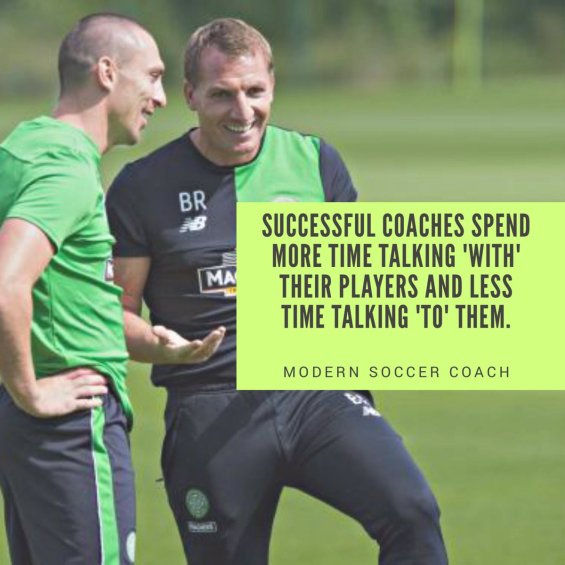
As coaches we are regularly told that training sessions for young players should be fun and enjoyable. Yet when coaching adults, we expect our players to serious. This has always confused me. I want my players to enjoy the sessions but be able to understand the aims of the session, this will then allow the aims to be transferred to games. If the players enjoy the sessions then they are more likely to turn up week in week out, as a coach if you’ve got regular numbers then its easier to plan sessions. I have also found that if the players enjoy the session then they will exert maximum effort, whereas if they find it boring or too easy/hard they will lose interest and stop trying as hard.
When I start coaching a new group of players, I always gather them together and say, “my role as your coach is to improve you as individuals and as a team, I’m not here to massage my own ego”. I also explain that I will plan and deliver sessions from what I have observed from previous games. I, however, say to the players that if they are things they feel there are that they need to work on then I want to know, and I will plan and deliver a session for them. I also say to the players that if there is a something I have done in that session that they enjoy then to tell me and if there’s something they didn’t enjoy then I want to know. I don’t just want the players to say they didn’t enjoy something, I want to know the reasons why.
As a coach I need to be approachable, I need to have a relationship with my players that allows for a two-way conversation and I need to allow the players to trust me. At my current team we have a reserve team and a first team, I help either team on a match day depending on the needs of either team. Before the training session I will ask certain players of the team I didn’t help on how their game went, this not only builds a rapport with the players, but it also gives me an idea on what went right and what they can improve on. The players I ask will usually be the captain and senior members of the squad. If I feel a player has put a large amount of effort into the session, then I will either make a point of telling them face to face or message them privately thanking them for their efforts. One thing I have to be aware of is making sure the relationship remains that of player and coach. If the players have arranged a team night out or social occasion I very rarely attend, this occasion is for the players and a chance for them to unwind.
If I can build a rapport with the players and allow for open conversations, then this allows me to plan and deliver a session that I know the majority of the players will enjoy. You cannot please all your players but if I see that one player has not enjoyed the session, I will have a private conversation with them. I will seek to determine why they didn’t and explain that I will seek to address their concerns in the next session. All coaches can improve, and all coaches can make mistakes, we should appreciate any feedback we receive. What better way to improve as a coach than to listen to the people involved in the session?
The blame game
Benjamin Franklin once said that there’s two things certain in the world: death and taxes. In more contemporary times it appears there’s a third, football managers and coaches blaming a match official for a defeat on social media.

In all my years coaching I do not feel I have ever come across a match official appointed by the league that has ever “cheated” my team enough that I felt it was their fault we lost the game. That’s not to say there has not been times when I feel the officials have made a decision that I have not agreed with. I’ve also felt that the match officials have made what they believe is an honest decision.
However, the blaming of referees for a result or saying “the match officials had a poor game” is becoming more and more prevalent in the days of social media. Whilst some of these might be said in the heat of the moment after the game, most of these appear to have not been deleted which means they are sticking by their original thoughts.
By blaming the match officials, it could be said that you’re giving your players an excuse for the result. If they believe that you as a manager will blame someone else than how can you expect them to reflect on their own performance. It could lead to some players thinking that they have performed well enough and you are happy with how they played. At the end of each game, a player and manager should always reflect on their performance, what went well and what could we have done better. This will allow you as a manager to plan the next training session to improve your performance for the next game.
As a coach you tend to get at least one training session a week with your players to work on various situations. In grassroots football especially, the chances of getting an equal number of players to a training session are slim. Why not use this session to play a game-based scenario where one team has a player less and mimic having a player sent off? You can work on various formations and explain to your players how you want them to play depending on the time left in the game. Another possibility if the referee gives a goal that you feel is wrong, practice a situation where your team is a goal down with a certain time of the game left. Doing this will allow yourself and your players to know what to do in various situations, then if one of these situations happens in a game the players will be able to refer to your session. Blaming the match official appears an easy way out to me. It’s easier to blame someone else for the result rather than looking in the mirror. It takes a lot to admit that you did not deal with a situation that occurred or even more so than you did not know how to deal with the situation. There should be no shame in this, view it as a way to improve yourself and your team.
So, before you’re quick to blame a match official, who more than likely is a volunteer or getting a small fee, to officiate your game. Think what could we have done in that situation? Did we do enough over the course of the 90 minutes to win the game? Or were we quite simply beaten by the better team on the day? With the number of qualified referees dropping due to the abuse they receive; would you rather have an official who’s made a decision you don’t agree with or have no game at all because all the match officials have quit?
Change of mind and plan
My first obsession with football and tactics started with my love of championship manager and then football manager. As this obsession grew and many an hour was spent, some would say wasted, on this game I felt I wanted to get in to coaching football in my spare time and get me away from the confines of my bedroom and a laptop screen.
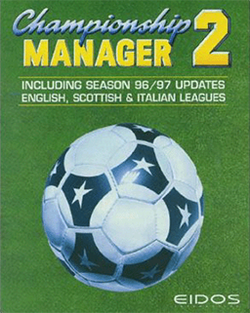
This was 2009 and I was lucky that someone I worked with knew someone who needed help with coaching. I went in to the role with all these ideas and how I wanted things to be done both on and off the field. We had a few successes with this team and I enjoyed the training sessions and matches. The manager and I would not always agree on everything but we had regular chats about the team and training. During this time I passed my FA Level One Coaching award. Unfortunately the role with the team ended as my relationship at the time also ended and I had to move from the area.
I moved back to my hometown and took over an u15s team of my own. This team was not the best in the area but I was relishing the challenge of improving the team and looking forward to the season. I made many mistakes over the course of the season and my confidence took a battering. I got someone in to help with training and matches and whilst this did not have much improvement on the field it helped my confidence. I lasted 18 months with this team before I decided to walk away. There was many issues why I walked away, some to do with players, some to do with parents but the main one was the lack of confidence in my ability and I felt that I was holding the team back.
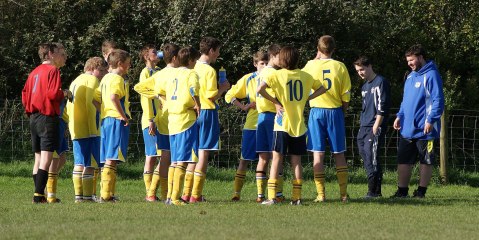
During this time I had enrolled on a coaching course at a local college as I wanted to improve as a coach. Upon finishing the course I decided I wanted to take my education further and go to university to study. I decided upon Southampton Solent University to study football. Towards the end of the first year at university I decided I wanted to try coaching again and contacted a local FA who put me in touch with a local club. I ended up coaching an u5 and u6 age group, this was a massive difference for me but I enjoyed it. I then took control fully of the u6s in the January of 2016 and we started the league season as the u7s in the September 2016. We started well in the summer tournaments and the in the league and we were actually promoted by the end of November as we were doing so well. Two of my players currently train with a premier league club and are loving the experience. As we got promoted results started to drop and we struggled to win games. The kids were still loving playing football but my enjoyment started to drop as well as my confidence in my ability to improve results and performances.
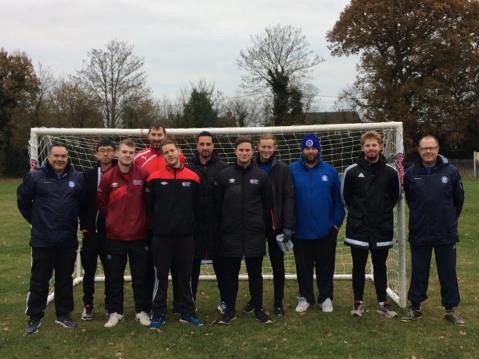
During the time at university I have also coached a senior women’s team which again I walked away from due to lack of confidence in my ability to change results. I was then contacted by the chairman of the club and asked to help with the men’s reserve team. Results were good and we had a good young team with massive potential. I still coach this team but I’ve started to find that one bad training session even though they aren’t common affects me a lot more than ten good sessions. I am constantly thinking about what went wrong and worrying about how I’m perceived by players and other coaches. I fully intend to commit to this team for the current season as I always have, I have only missed 3 training sessions in over a year and only missed one game.
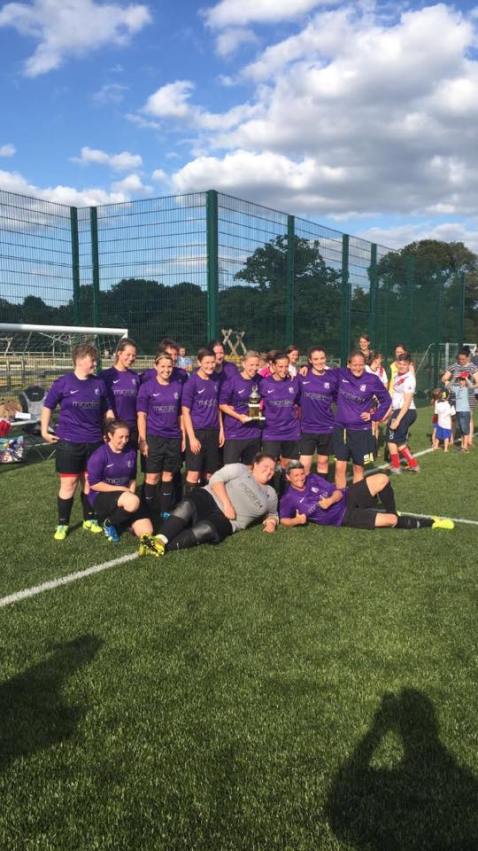
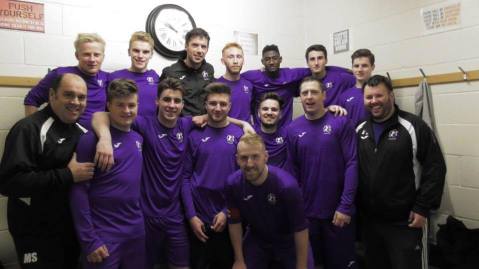
However, I feel my enjoyment from coaching is not where I want it to be and therefore this current season will be my last one coaching in any capacity. When I came to university I wanted to be a coach full time and make a career from it but I don’t think I enjoy coaching as much I thought I did and do not think I am good enough to make a career out of coaching in what is a very competitive area.
This has by far been the hardest blog I have ever written and I appreciate you reading it.
Equal playing time
Over the last couple of months I have seen an increase in the debate about equal playing time in grassroots youth football. People have asked questions regarding the topic on the coaching family (@coaching family) on twitter and football coaching lesson plans on Facebook, whilst the general feedback has been positive there has been examples of players and parents complaining that their child is sat on the side lines whilst other children get more playing time.
When thinking about this topic, there are only two reasons I can think of for giving a player more time than others, the first reason is that their child plays for the team and therefore the coach wants their child to have more playing time. The second reason is the most likely and most common, unfortunately some coaches in grassroots youth football care more about winning matches than developing all their players equally.
Now I am not saying that I am the perfect coach and I always put the development of all my players first but I do try to give equal playing time to all my players. I currently coach an under 7s grassroots football team. We played in 3 tournaments over the summer and our season started on the 4th of September. With it being our first season I had no idea of the strength of our opposition, now this would make it easy for me to start with the players considered to be the strongest and then bring other players on as and when the score allows me to. However I decided that this would not be the best form of development of my team and more importantly the players. Before each game I sit down, pick the starting 5 players and the amount of game time they are going to get in each game. Shown below is the guides I used to help me work out the playing time.
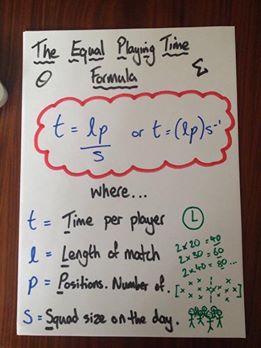
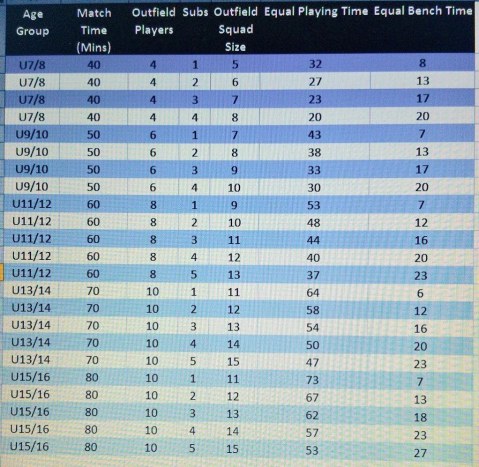
We play four lots of 10 minutes against the same opposition. In the first league game, the same player went in goal for the full 40 minutes and each other player in the squad of eight got 20 minutes playing time. Each player played a full game, started one game coming off after 5 minutes and came on in one game after 5 minutes with one game for a rest. Each outfield player took it in turns to play in each outfield position. In the game yesterday my normal goalkeeper was unavailable so 3 of the normal outfield players took in turns to go in goal. The parents of my players have informed me of dates their child is unavailable and this is fine as I know that all my players have played in various positions on the pitch, if a certain player is missing I know that any other player can play there and they will know how to play that position as they have played there before. One player yesterday was asking when he was going to play in a game, he wasn’t saying it because he thought he was better than any of the players on the pitch, he just wanted to be playing the game he loves, I said to him would you like it if you turned up and played for five minutes and someone else played every game, he said no and understands that each player needs to get equal playing time.
Whilst winning games and tournaments is a nice feeling I personally feel seeing the enjoyment of the kids playing the game and the enjoyment on a child’s face when they score a goal is a better feeling. By giving equal playing time to each child i also feel that his has helped bring the squad together, there is no them and us mentality as each player feels they are as important as each other. Even though some of the players go to different schools the whole squad get on with each other and support each other both on and off the pitch. I am also lucky that the parents of my players do not complain about playing time and understand that I have no favourites. All parents attend each game and will support the team no matter if their child is on the field of play at the time.
Elite Player Performance Plan
The Elite Player Performance Plan (EPPP) was first suggested by the Premier League and was accepted by the 72 Football League clubs on 20th October 2011. 46 clubs voted in favour, 22 against, 3 no-shows and 1 abstention. The aim was to take Premier League Youth Development to the next level. With six key principles:
- Increase the number and quality of Home Grown Players gaining professional contracts in the clubs and playing first-team football at the highest level
- Create more time for players to play and be coached
- Improve coaching provision
- Implement a system of effective measurement and quality assurance
- Positively influence strategic investment into the Academy System, demonstrating value for money
- Seek to implement significant gains in every aspect of player development
The idea is to improve the development of young English players and try to improve the amount of talent available to the England National team. The Football Association (FA) followed Belgium who implemented their own plan of how to develop players. The Belgians looked at different forms of youth development from around the world and held meetings with the French, Dutch and German FA’s as well as clubs such as Ajax and Barcelona. The University of Louvain analysed 1,500 youth games and found that players of 8-9 years old touched the ball on average twice in half an hour. This is obviously not enough to develop a player in some of the most important years of their development. The Belgian FA then implemented 2v2, 5v5 and 8v8 games to increase the amount of time a player touched the ball and encouraged dribbling, passing and movement.
Each club’s academy is independently audited and given a category status of 1 to 4, with 1 being the highest awarded. There is 10 different factors that are taken into consideration including:
- Productivity rates
- Training facilities
- Coaching
- Education
- Welfare provisions
The higher the category a clubs academy is awarded the more funding they will receive. EPPP focuses on key areas such as:
- Allowing clubs to have more coaching time with their young players
- Helping clubs foster links with local schools in order to help young players get the best out of their football education as well as the academic side
- Allowing clubs that have earned a top category grading to recruit young talent from further afield than is permitted under the current rules
- Working with the Football League to review the current system used for determining compensation
One of the main benefits of EPPP is that clubs are able to sign young players from anywhere in the country as opposed to the previous rule of only being able to sign a player from within 90 minutes of their training facility. This caused problems for clubs such as Liverpool and Southampton who are situated on the coast.
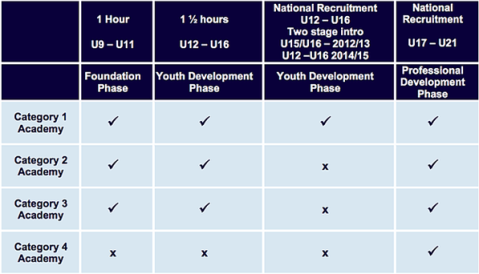
Another benefit is the amount of coaching hours a club is allowed to spend with its youth players. This means the academies that are awarded the highest award will be able to develop players from under 9 until they are 21 and will be able to provide up to 8,500 hours of training. However, a club awarded category 4 status will only be able to sign after they are 17 and have been released from another club
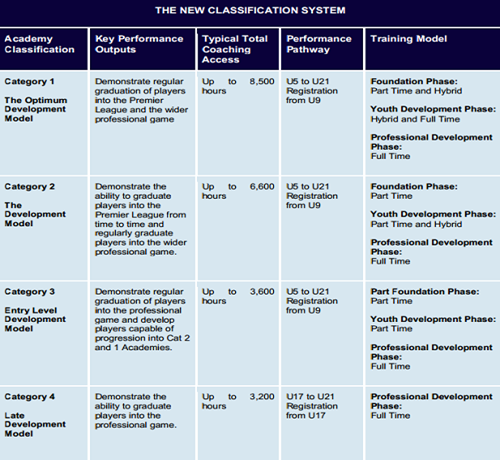
When it comes to the cost of the academy at each level it is obvious that clubs in the lower leagues will struggle to reach the category 1 or 2 status as they will not have the funds able to meet the criteria.

There are 10 Key Performance Indicators (KPIs) which include the ratio of coaches per player dependent on the category and age group. At a category 1 club for player’s u21 the ratio must be 1:8 or better. By including education for the players it will help the players if they do get released, as they will not have missed out on vital education that they might not have previously received.
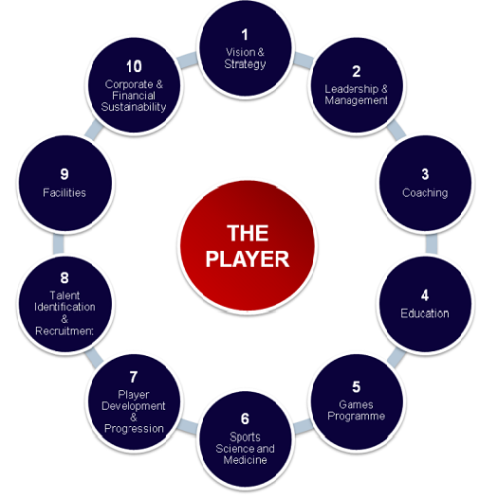
Whilst there are many benefits of EPPP. one of the problems with it is the higher the category an academy is awarded then the more funding they get from the FA. This would seem to be rewarding the elite Premier League clubs than can afford to run the academies to the required standard in the first place and gives little chance of smaller clubs reaching the required criteria. Another problem is that a scout from a club can turn up to watch a potential transfer target with less than 24 hours notice. If a club wants to sign a player from another club then the amount of compensation they have to pay can be minimal, using the tables below if a player is with his original club from the age of 9 until he is 13 at a category 2 academy, the club signing him will pay £9,000 for the three years between 9-11 and then £25,000 for the two years at age 12-13, this equates to £34,000, only once the player starts making first team appearances does the original club start making any significant amount of money. This is a minimal amount for a club that has spent money and developing the player, once you take into consideration that the minimum the category 2 club can spend on their academy is £1m and the Premier League will only subsidise between £775,000 for a category 1 academy down to £100,000 for a category 4 academy.
An example of this is Oldham, when Tome Eaves left the club to join Bolton Wanderers, they compared the £300,000 they received to the initial payment of £12,500 they would have received under EPPP. Oldham spend around £437,000 on their academy annually, less than half of this comes from grants. If the club sold one player for the same value as Tom Eaves under the old system each year then the academy would pay for itself.

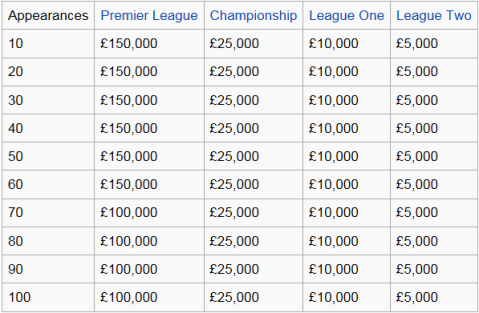
When asked why clubs agreed to the changes, it was revealed that the Premier League said that they would withdraw their £5m annual funding of youth and grassroots development if they didn’t. This could be seen to suggest that Premier League were forcing the football league clubs into agreeing to EPPP to suit their own agenda. Taking this into consideration various clubs have decided to scrap their academies due to the cost, the most recent example of this is Brentford. They club stated that the “development of young players must make sense from a business perspective. The review has highlighted that, in a football environment where the biggest Premier League clubs seek to sign the best young players before they can graduate through an Academy system, the challenge of developing value through that system is extremely difficult. Therefore, as a result of this review, the decision has been taken to completely restructure the Club’s Academy system. From next season, the Club will be withdrawing from the EPPP and Professional Development League system. We will also no longer be running a full Academy system from Under-eight through to Under-21 level.” Instead of running a full academy system the club has decided to have an “elite” squad of 18 players aged 17-21 which will have a clear pathway to the first team.
Taking all the data into consideration, it would appear that EPPP is beneficial for Premier League clubs but for football league clubs there is no benefit in the short and medium team. With various football league clubs withdrawing from EPPP, there can be serious questions over the system and whether it will remain in the near future. Regarding player development, if clubs such as Brentford are no longer signing players under the age of 17 then where do these players go to be trained? The clubs that remain in EPPP will only have a limited squad size so there will be even competition for places and therefore participation rates could drop.
Parents conduct
Recently I have been reading and hearing a lot about the conduct of parents at grassroots junior football games. I started coaching in 2009 in a place labelled as “the most working class town in the country” and have since coached in two different areas, one in a quiet northern town and most recently in a village near my university of Southampton. I have worked with various age groups from under fives up to under sixteen year olds.
During this time I have had problems with players arguing and fighting. One of these incidents led to some racist abuse towards one of my players from one of his team-mates. This was dealt with by the club very strictly and swiftly. Not once have I had to deal with parents due to their conduct. In fact I have found that most parents appreciate what we coaches have to do and the time we give as volunteers. Parents have helped with lifts to and from games, encouraged all players whether it is their child or not and helped with much needed fund raising events for the clubs. At every club I have coached we have a code of conduct that everyone must sign before joining, this sets out all expectations of myself (the coach), the players, and the parents. By having this code of conduct I feel it reminds all involved of how they are expected to act both at games and at training sessions. Any misdemeanor by anyone is dealt with by having a private conversation advising the party that this is not what is expected of them and that it is not acceptable. I feel this is usually the first and last time I have to remind them. Each club also has a FA trained welfare officer that is responsible for various factors such as anti-bullying measures to encouraging parents to sign up the FA’s respect codes. At my present club the welfare officer is present at various training sessions on a Saturday to interact with the parents, coaches, and players. This makes them more approachable. I also remain calm on the touchline during games and only offer encouragement to my players. I never berate my players but only offer advice and solutions on a one to one basis. This shows to the parents, spectators and players that this is the only type of support I want and expect to hear at my games.
Whilst I have only been coaching for a short period of time and you could say I have been lucky with the clubs I have been involved with, I feel that most parents only want their children to enjoy the game and want the best for their child. Some parents may take this too far but I feel the minority of parents are the ones giving the majority a bad name. The welfare officers and code of conduct implemented by most clubs in grassroots junior football will hopefully make the small minority even smaller in the future and more children will be able to enjoy playing football.

Recent Comments